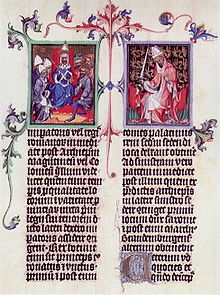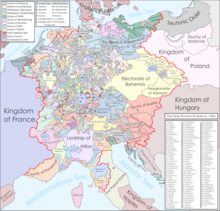|
Golden Bull of 1356
The Golden Bull of 1356 (Czech: Zlatá bula, German: Goldene Bulle, German pronunciation: [ˈɡɔldənə ˈbʊlə] ⓘ, Latin: Bulla Aurea, Italian: Bolla d'oro) was a decree issued by the Imperial Diet at Nuremberg and Metz (Diet of Metz, 1356/57) headed by the Emperor Charles IV which fixed, for a period of more than four hundred years, important aspects of the constitutional structure of the Holy Roman Empire. It was named the Golden Bull for the golden seal it carried.[1] In June 2013, the Golden Bull was included in the UNESCO's Memory of the World Register.[2] BackgroundAccording to the written text of the Golden Bull of 1356:
Though the election of the King of the Romans by the chief ecclesiastical and secular princes of the Holy Roman Empire was well established, disagreements about the process and papal involvement had repeatedly resulted in controversies, most recently in 1314 when Louis of Bavaria and Frederick of Austria had been elected by opposing sets of electors. Louis, who had eventually subdued his rival's claim on the battlefield,[4] made a first attempt to clarify the process in the Declaration of Rhense of 1338, which renounced any papal involvement and had restricted the right to choose a new king to the prince-electors. The Golden Bull, promulgated by Louis's successor and rival, Charles IV, was more precise in several ways. Prince-electorsFirstly, the Bull explicitly named the seven Prince-electors (Kurfürsten) who were to choose the King and also defined the Reichserzämter, their (largely ceremonial) offices at court:[5] 
Secondly, the principle of majority voting was explicitly stated for the first time in the Empire. The Bull prescribed that four (out of seven) votes would always suffice to elect a new King; as a result, three Electors could no longer block the election. Thirdly, the Electoral principalities were declared indivisible, and succession to them was regulated to ensure that the votes would never be divided. Finally, the Bull cemented a number of privileges for the Electors, confirming their elevated role in the Empire. It is therefore also a milestone in the establishment of largely independent states in the Empire, a process to be concluded only centuries later, notably with the Peace of Westphalia of 1648.  This codification of prince-electors, though largely based on precedence, was not uncontroversial, especially in regard to the two chief rivals of the ruling House of Luxembourg:
Procedures The bull regulated the whole election process in great detail, listing explicitly where, when, and under which circumstances what should be done by whom, not only for the prince-electors but also (for example) for the population of Frankfurt, where the elections were to be held, and also for the counts of the regions the prince-electors had to travel through to get there. The decision to hold the elections in Frankfurt reflected a traditional feeling dating from East Frankish days that both election and coronation ought to take place on Frankish soil.[5] However, the election location was not the only specified location; the bull specified that the coronation would take place in Aachen, and Nuremberg would be the place where the first diet of a reign should be held.[6] The elections were to be concluded within thirty days; failing that, the bull prescribed that the prince-electors were to receive only bread and water until they had decided:
Besides regulating the election process, the chapters of the Golden Bull contained many minor decrees. For instance, it also defined the order of marching when the emperor was present, both with and without his insignia. A relatively major decision was made in chapter 15, where Charles IV outlawed any conjurationes, confederationes, and conspirationes, meaning in particular the city alliances (Städtebünde), but also other communal leagues that had sprung up through the communal movement in mediaeval Europe. Most Städtebünde were subsequently dissolved,[citation needed] sometimes forcibly, and where refounded, their political influence was much reduced.[citation needed] Thus the Golden Bull also strengthened the nobility in general to the detriment of the cities.[citation needed]  The pope's involvement with the Golden Bull of 1356 was basically nonexistent, which was significant in the history of relations between the popes and the emperors. When Charles IV laid down procedure for electing a King of the Romans, he mentioned nothing about receiving papal confirmation of the election. However, Pope Innocent VI did not protest this because he needed Charles’s support against the Visconti.[9] Pope Innocent continued to have good relations with Charles IV after the Golden Bull of 1356 until the former's death in 1362.[10] References
Sources
Further reading
External links
|
|||||||||||||||||||||||||||||||||||||||||
